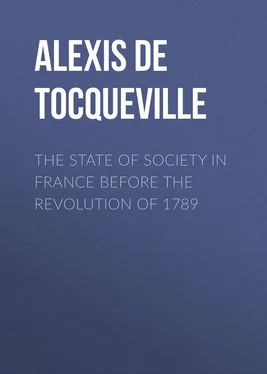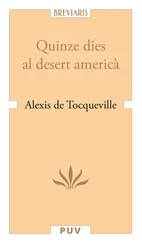Alexis de Tocqueville - The State of Society in France Before the Revolution of 1789
Здесь есть возможность читать онлайн «Alexis de Tocqueville - The State of Society in France Before the Revolution of 1789» — ознакомительный отрывок электронной книги совершенно бесплатно, а после прочтения отрывка купить полную версию. В некоторых случаях можно слушать аудио, скачать через торрент в формате fb2 и присутствует краткое содержание. Жанр: foreign_prose, История, foreign_edu, foreign_antique, на английском языке. Описание произведения, (предисловие) а так же отзывы посетителей доступны на портале библиотеки ЛибКат.
- Название:The State of Society in France Before the Revolution of 1789
- Автор:
- Жанр:
- Год:неизвестен
- ISBN:нет данных
- Рейтинг книги:3 / 5. Голосов: 1
-
Избранное:Добавить в избранное
- Отзывы:
-
Ваша оценка:
- 60
- 1
- 2
- 3
- 4
- 5
The State of Society in France Before the Revolution of 1789: краткое содержание, описание и аннотация
Предлагаем к чтению аннотацию, описание, краткое содержание или предисловие (зависит от того, что написал сам автор книги «The State of Society in France Before the Revolution of 1789»). Если вы не нашли необходимую информацию о книге — напишите в комментариях, мы постараемся отыскать её.
The State of Society in France Before the Revolution of 1789 — читать онлайн ознакомительный отрывок
Ниже представлен текст книги, разбитый по страницам. Система сохранения места последней прочитанной страницы, позволяет с удобством читать онлайн бесплатно книгу «The State of Society in France Before the Revolution of 1789», без необходимости каждый раз заново искать на чём Вы остановились. Поставьте закладку, и сможете в любой момент перейти на страницу, на которой закончили чтение.
Интервал:
Закладка:
These institutions were not copied from the Roman legislation; 3 3 See Note I., on the Power of the Roman Law in Germany.
indeed they were so much opposed to it that recourse was had to the Roman law to alter and abolish them. They have certain original characteristics which distinguish them from all other laws invented by mankind. They corresponded to each other in all their parts, and, taken together, they formed a body of law so compact that the articles of our modern codes are not more perfectly coherent; they were skilfully framed laws intended for a half-savage state of society.
It is not my purpose to inquire how such a system of legislation could have arisen, spread, and become general throughout Europe. But it is certain that in the Middle Ages it existed more or less in every European nation, and that in many it prevailed to the exclusion of every other.
I have had occasion to study the political institutions of the Middle Ages in France, in England, and in Germany, and the further I proceeded in my labours the more was I astonished at the prodigious similarity which existed amongst all these various sets of laws; and the more did I wonder how nations so different, and having so little intercourse, could have contrived laws so much alike. Not but they continually and almost immeasurably differ in their details and in different countries, but the basis is invariably the same. If I discovered a political institution, a law, a fixed authority, in the ancient Germanic legislation, I was sure, on searching further, to find something exactly analogous to it in France and in England. Each of these three nations helped me more fully to understand the others.
In all three the government was carried on according to the same maxims, political assemblies were formed out of the same elements, and invested with the same powers. Society was divided in the same manner, and the same gradation of classes subsisted in each; in all three the position of the nobles, their privileges, their characteristics, and their disposition were identical; as men they were not distinguishable, but rather, properly speaking, the same men in every place.
The municipal constitutions were alike; the rural districts were governed in the same manner. The condition of the peasantry differed but little; the land was owned, occupied, and tilled after the same fashion, and the cultivators were subjected to the same burthens. From the confines of Poland to the Irish Channel, the Lord’s estate, the manorial courts, the fiefs, the quit-rents, feudal service, feudal rights, and the corporations or trading guilds, were all alike. Sometimes the very names were the same; and what is still more remarkable, the same spirit breathes in all these analogous institutions. I think I may venture to affirm, that in the fourteenth century the social, political, administrative, judicial, economical, and literary institutions of Europe were more nearly akin to each other than they are at the present time, when civilisation appears to have opened all the channels of communication, and to have levelled every obstacle.
It is no part of my scheme to relate how this ancient constitution of Europe gradually became wasted and decayed; it is sufficient to remark that in the eighteenth century it was everywhere falling into ruin. 4 4 See Note II., on the passage from Feudal to Democratic Monarchy.
On the whole, its decline was less marked in the east than in the west of the continent; but on all sides old age and decrepitude were visible.
The progress of this gradual decay of the institutions of the Middle Ages may be followed in the archives of the different nations. It is well known that each manor kept rolls called terriers , in which from century to century were recorded the limits of fiefs and the quit-rents, the dues, the services to be rendered, and the local customs. I have seen rolls of the thirteenth and fourteenth centuries which are masterpieces of method, perspicuity, concision, and acuteness. The further we advance towards modern times the more obscure, ill-digested, defective, and confused do they become, in spite of the general progress of enlightenment. It seems as if political society became barbarous, while civil society advances towards civilisation.
Even in Germany, where the ancient constitution of Europe had preserved many more of its primitive features than in France, some of the institutions which it had created were already completely destroyed. But we shall not be so well able to appreciate the ravages of time when we take into account what was gone, as when we examine the condition of what was left.
The municipal institutions which in the thirteenth and fourteenth centuries had raised the chief towns of Germany into rich and enlightened small republics, still existed in the eighteenth; but they were a mere semblance of the past. Their ancient traditions seemed to continue in force; the magistrates appointed by them bore the same titles and seemed to perform the same functions; but the activity, the energy, the municipal patriotism, the manly and prolific virtues which they formerly inspired, had disappeared. These ancient institutions appeared to have collapsed without losing the form that distinguished them. 5 5 See Note III., on the Decay of the Free Towns of Germany.
All the powers of the Middle Ages which where still in existence seemed to be affected by the same disease; all showed symptoms of the same languor and decay. Nay more, whatever was mixed up with the constitution of that time, and had retained a strong impression of it, even without absolutely belonging to those institutions, at once lost its vitality. Thus it was that the aristocracy was seized with senile debility; even political freedom, which had filled the preceding centuries with its achievements, seemed stricken with impotency wherever it preserved the peculiar characteristics impressed upon it by the Middle Ages. Wherever the Provincial Assemblies had maintained their ancient constitution unchanged, they checked instead of furthering the progress of civilisation; they seemed insensible and impervious to the new spirit of the times. Accordingly the hearts of the people turned from them towards their sovereigns. The antiquity of these institutions had not made them venerable: on the contrary, the older they grew the more they fell into discredit; and, strangely enough, they inspired more and more hatred in proportion as their decay rendered them less capable of mischief. ‘The actual state of things,’ said a German writer, who was a friend and contemporary of the period anterior to the French Revolution, ‘seems to have become generally offensive to all, and sometimes contemptible. It is strange to see with what disfavour men now look upon all that is old. New impressions creep into the bosom of our families and disturb their peace. Our very housewives will no longer endure their ancient furniture.’ Nevertheless, at this time Germany, as well as France, enjoyed a high state of social activity and constantly increasing prosperity. But it must be borne in mind that all the elements of life, activity and production, were new, and not only new, but antagonistic to the past.
Royalty no longer had anything in common with the royalty of the Middle Ages, it enjoyed other prerogatives, occupied a different place, was imbued with a different spirit, and inspired different sentiments; the administration of the State spread in all directions upon the ruins of local authorities; the organised array of public officers superseded more and more the government of the nobles. All these new powers employed methods and followed maxims which the men of the Middle Ages had either not known or had condemned; and, indeed, they belong to a state of society of which those men could have formed no idea.
Читать дальшеИнтервал:
Закладка:
Похожие книги на «The State of Society in France Before the Revolution of 1789»
Представляем Вашему вниманию похожие книги на «The State of Society in France Before the Revolution of 1789» списком для выбора. Мы отобрали схожую по названию и смыслу литературу в надежде предоставить читателям больше вариантов отыскать новые, интересные, ещё непрочитанные произведения.
Обсуждение, отзывы о книге «The State of Society in France Before the Revolution of 1789» и просто собственные мнения читателей. Оставьте ваши комментарии, напишите, что Вы думаете о произведении, его смысле или главных героях. Укажите что конкретно понравилось, а что нет, и почему Вы так считаете.












